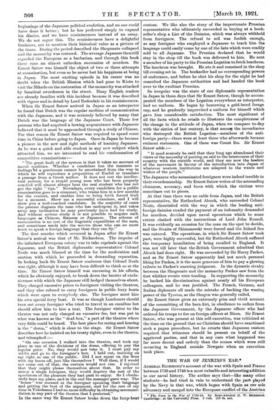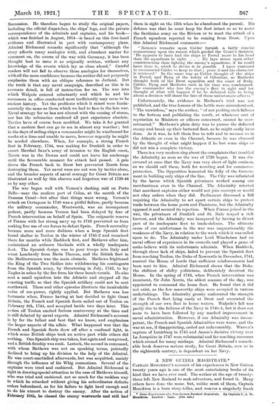THE WAR OF JENKINS'S EAR.*
ADMIRAL RicHmown's account of the war with Spain and France between 1739 and 1748 is a most valuable and interesting addition to our naval history. The author says that—like many other students—he had tried in vain to understand the part played by the Navy in that war, which began with Spain as our sole adversary and merged into the European conflict of the Austrian • The Nary M the WISP of 1739-48. By Bear-Admiral R. W. Richmond. Cambridge: at the Univendty Press. 9 vols. if8 es. net. Succession. He therefore began to study the original papers, including the official dispatches, the ships' logs, and the private correspondence of the admirals and captains, and his book— which was finished in August, 1914—is based on this first-hand evidence and illustrated in part with contemporary plans. Admiral Richmond remarks significantly that " although the story affords many analogies with, and abundant matter for comment on, the course of the war with Germany, it has been thought best to issue it as originally written, without any knowledge of the events which lay so close ahead." Careful readers will not fail to observe those analogies for themselves, with all the more confidence because the author did not purposely emphasize them with an oblique reference to Jutland. But the truth is that any naval campaign, described as this is in accurate detail, is full of instruction for us. The war into which Walpole entered reluctantly and which he and his successors in office conducted most inefficiently may seem to be ancient history. Yet the problems which it raised were funda- mentally the same as those which we had to face in the late war. Naval strategy for us has not altered with the coming of steam, nor has the submarine rendered all past experience obsolete. Tactics have of course been modified. We take it for granted that a modern fleet can go to sea in almost any weather ; but in the days of sailing-ships a commander might be windbound for weeks at a time and unable to move, however urgently he might be needed elsewhere. When, for example, a strong French fleet in February, 1744, was making for Dunkirk in order to escort Marshal Saxe's army of invasion to the English coast, Norris was in the Downs and could not leave his anchorage until the favourable moment for attack had passed. A gale drove the French back to Brest but prevented Norris from destroying them. Yet naval wars are not won by tactics alone, and the broader aspects of naval strategy for Great Britain are illustrated as well by this obscure and forgotten war of 1739-48 as by any other.
The war began well with Vernon's dashing raid on Porto Bello—near the modern port of Colon, at the mouth of the Panama Canal—but after that things went wrong. Vernon's attack on Cartagena in 1740 was a pitiful failure, partly because the military commander, Wentworth, was an incompetent pedant, partly because Vernon had been delayed by fear of French intervention on behalf of Spain. The enigmatic reserve of France with her strong navy up to 1743 prevented us from making free use of our forces to defeat Spain. French neutrality became more and more dubious when a large Spanish fleet found shelter in Toulon in the winter of 1741-2 and remained there for months while Haddock first, and Mathews after him, maintained an arduous blockade with a wholly inadequate fleet. The Spanish design was to pour troops into Italy and wrest Lombardy from Maria Theresa, and the British fleet in the Mediterranean was the main obstacle. Mathews frightened the King of the Two Sioilies into withdrawing his contingents from the Spanish army, by threatening in July, 1742, to lay Naples in ashes by the fire from his three bomb-vessels. He also sent a small squadron into the Adriatic and stopped all the coasting traffic so that the Spanish artillery could not be sent northward. These and other episodes illustrate the incalculable value of sea-power, rightly applied. But Mathews was less fortunate when, France having at last decided to fight Great Britain, the French and Spanish fleets sailed out of Toulon on February 8th, 1744, and accepted battle two days later. This action off Toulon excited furious controversy at the time and is still debated by naval experts. Admiral Richmond's account is by far the fullest and best that we know, and emphasizes the larger aspects of the affair. What happened was that the French and Spanish fleets drew off after a confused fight, in which some British ships took an active part while others did nothing. One Spanish ship was taken, lost again and recaptured, and a British fireship was sunk. Lestock, the second in command, with whom Mathews was not on speaking terms, pointedly declined to bring up his division to the help of the Admiral. He was court-martialled afterwards, but was acquitted, mainly through the influence of his Whig connexions. Several of the captains were tried and cashiered. But Admiral Richmond is right in drawing special attention to the case of Mathews himself, who was tried and cashiered. not so much for the reckless way in which he attacked without giving his subordinates definite others beforehand, as for his failure to fight hard enough and to do his utmost to destroy the enemy. After the action of February 10th, he chased the enemy westwards and still had them in sight on the 13th when he abandoned the pursuit. His
defence was that he must keep his fleet intact so as to assist the Sardinian army on the Riviera or to meet the attack of a
French squadron reported to be coming from Brest. Upon this Admiral Richmond comments :-
" Nelson's remarks upon Calder furnish a fairly concise commentary upon the reason which guided the Court's decision. ' He appears to have had the ships at Ferrol more in his head than the squadrons in sight. . . . He lays stress upon other considerations than fighting the enemy's squadrons, if he could have done it, which he denies to be possible. I have ventured to recommend Calder to keep to that ; prove it and his character is retrieved.' In the same way as Calder thought of the ships in Ferrol, and Byng of the safety of Gibraltar, so Mathews thought both of the Brest squadron and the coast of Italy. Calder, Byng and Mathews each in his time was condemned. The commander who has the enemy's fleet in sight and for thought of what will happen if he be defeated fails to bring about a decision will share the fate of those unfortunate officers."
Unfortunately, the evidence in Mathews's trial was not publiihed, and the true lessons of the battle were misunderstood.
" The unwisdom," says the author, " of not probing such failures to the bottom and publishing the result, at whatever cost of reputation to Ministers or officers concerned, cannot be over- estimated." Mathews's plain duty was to pursue the defeated enemy and break up their battered fleet, as he might easily have done. As it was, he left them free to refit and to menace us in the Atlantic or even in the Channel, because he was obsessed by the thought of what might happen if he lost some ships or did not win a complete victory.
There is a very modern ring about the complaints that troubled the Admiralty as soon as the war of 1739 began. It was dis- covered at once that the Navy was very short of light cruisers, as we should call them, both for scouting and for commerce- protection. The Opposition lamented the folly of the Govern- ment in building only ships of the line. The City was infuriated by the havoc which Spanish privateers worked among our merchantmen even in the Channel. The Admiralty retorted that merchant captains either would not join convoys or would not obey orders when they did. Parliament discussed a Bill
requiring the Admiralty to set apart certain ships to protect trade between the home ports and Finisterre, but the Admiralty opposed it and secured its rejection. When France joined in the war, the privateers of Dunkirk and St. Maio reaped a rich
harvest, and the Admiralty was hampered by having to divert part of its inadequate fleet to trade-defence. The ultimate cause of our misfortunes in the war was unquestionably the weakness of the Navy, in relation to the work which it was called upon to do. The Admiralty under Lord Winchelsea had no naval officer of experience in its councils and played a game of make-believe with its unfortunate admirals. When Haddock, through sheer lack of ships, failed to prevent the Spanish fleet from reaching Toulon, the Duke of Newcastle in December, 1741, assured the House of Lords that sufficient reinforcements had been sent to him. Admiral Richmond shows that the Duke, the shiftiest of shifty politicians, deliberately deceived the House. In the spring of 1743, when French intervention was imminent, Sir John Norris, the ablest seaman of the day, was appointed to command the home fleet. He found that it did not exist, as the few seaworthy ships were occupied in various undertakings. The Admiralty grossly underrated the strength of the French fleet lying ready at Brest and overrated the strength of our own fleet in home waters. Walpole's fall was partly due to the failures of the Navy in 1740-1, but it does not seem to have been followed by any marked improvement in naval administration. However, if our Admiralty was incom- petent, the French and Spanish Admiralties were worse, and the war at sea, if disappointing, ended not unfavourably. Warren's capture of Louisburg in 1745 and Anson's decisive victory over La Jonquiere in 1747 were substantial and far-reaching successes which atoned for many mishaps. Admiral Richmond's remark- able book deserves serious study, for Great Britain, now as in the eighteenth century, is dependent on her Navy.



































 Previous page
Previous page